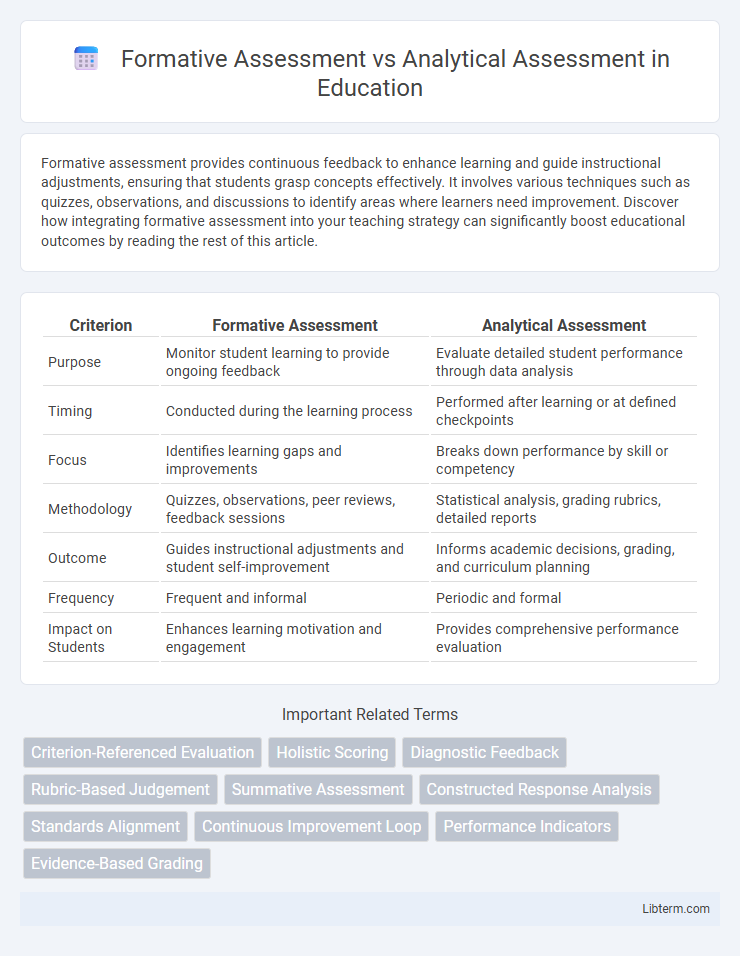Formative assessment provides continuous feedback to enhance learning and guide instructional adjustments, ensuring that students grasp concepts effectively. It involves various techniques such as quizzes, observations, and discussions to identify areas where learners need improvement. Discover how integrating formative assessment into your teaching strategy can significantly boost educational outcomes by reading the rest of this article.
Table of Comparison
| Criterion | Formative Assessment | Analytical Assessment |
|---|---|---|
| Purpose | Monitor student learning to provide ongoing feedback | Evaluate detailed student performance through data analysis |
| Timing | Conducted during the learning process | Performed after learning or at defined checkpoints |
| Focus | Identifies learning gaps and improvements | Breaks down performance by skill or competency |
| Methodology | Quizzes, observations, peer reviews, feedback sessions | Statistical analysis, grading rubrics, detailed reports |
| Outcome | Guides instructional adjustments and student self-improvement | Informs academic decisions, grading, and curriculum planning |
| Frequency | Frequent and informal | Periodic and formal |
| Impact on Students | Enhances learning motivation and engagement | Provides comprehensive performance evaluation |
Understanding Formative Assessment
Formative assessment involves ongoing evaluations designed to monitor student learning and provide continuous feedback to both instructors and learners, enhancing the educational process. It typically includes quizzes, observations, and discussions that inform instructional adjustments and support student progress in real time. This type of assessment contrasts with analytical assessment, which emphasizes detailed examination and evaluation of specific components of performance or content after instruction.
Defining Analytical Assessment
Analytical assessment involves evaluating specific components or criteria of student work to provide detailed feedback on strengths and areas for improvement. It breaks down performance into measurable elements, such as accuracy, reasoning, and presentation, to guide targeted learning interventions. This method contrasts with formative assessment, which broadly monitors ongoing learning progress to inform instructional adjustments.
Key Differences Between Formative and Analytical Assessment
Formative assessment primarily focuses on monitoring student learning through ongoing feedback to improve understanding and performance, while analytical assessment evaluates specific components and skills by breaking down complex tasks into measurable elements. Formative assessment is typically informal, frequent, and geared toward guiding instructional adjustments, whereas analytical assessment is more structured, detailed, and used for diagnosing strengths and weaknesses in specific areas. Key differences include the purpose, timing, feedback type, and depth of evaluation, making formative assessment effective for learning progression and analytical assessment critical for in-depth skill analysis.
Purposes and Objectives of Each Assessment Type
Formative assessment primarily aims to monitor student learning progress and provide ongoing feedback to improve teaching strategies and student understanding. Analytical assessment focuses on evaluating specific skills or knowledge components by breaking down complex tasks into measurable parts for detailed performance analysis. Each assessment type serves distinct purposes: formative assessment supports continuous improvement during learning, while analytical assessment targets precise identification of strengths and weaknesses for targeted interventions.
Common Strategies in Formative Assessment
Formative assessment employs strategies such as quizzes, peer reviews, and observational checklists to monitor student learning continuously. It prioritizes real-time feedback, enabling educators to adjust instruction and support individual progress effectively. Common techniques include exit tickets, concept maps, and self-assessment tools, which promote active student engagement and deeper understanding.
Techniques Used in Analytical Assessment
Analytical assessment techniques include item analysis, rubric scoring, and diagnostic testing, which focus on detailed evaluation of individual components of knowledge and skills. Data from analytical assessments are used to identify specific strengths and weaknesses, allowing targeted feedback and personalized instruction. Techniques such as cognitive interviews and protocol analysis also help in understanding students' thought processes for deeper insight.
Benefits of Formative Assessment
Formative assessment provides continuous feedback that enhances student learning by identifying strengths and weaknesses in real-time, allowing educators to adjust instruction effectively. It promotes active student engagement, fosters a growth mindset, and supports personalized learning pathways. This approach improves academic outcomes by enabling timely interventions and targeted skill development before summative evaluations.
Advantages of Analytical Assessment
Analytical assessment provides detailed insights into students' strengths and weaknesses by evaluating specific skills and knowledge components, enabling targeted instructional adjustments. It enhances the accuracy of student performance measurement through criterion-based scoring, fostering objective evaluation and fair grading practices. This approach supports data-driven decision-making for personalized learning plans and curriculum improvements by identifying precise areas needing intervention.
Choosing the Right Assessment Method
Choosing the right assessment method depends on the learning objectives and the stage of the instructional process. Formative assessment provides ongoing feedback that helps both instructors and students identify areas for improvement during learning, while analytical assessment evaluates students' understanding through detailed breakdowns of their performance on exams or projects. Prioritizing formative assessments supports skill development and knowledge retention, whereas analytical assessments offer comprehensive insights into mastery of specific concepts or competencies.
Integrating Formative and Analytical Assessments in Education
Integrating formative and analytical assessments in education enhances personalized learning by combining ongoing feedback with in-depth evaluation of student understanding and skills. Formative assessment provides real-time insights into students' progress, allowing educators to adjust instruction, while analytical assessment offers comprehensive data to identify patterns and inform curriculum development. This integrated approach supports continuous improvement and more targeted interventions, ultimately fostering higher student achievement.
Formative Assessment Infographic

 libterm.com
libterm.com